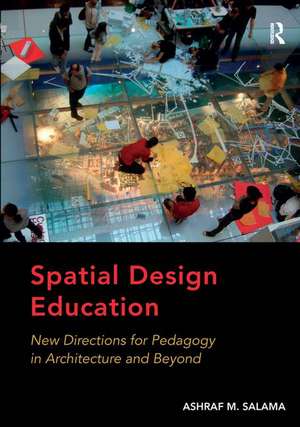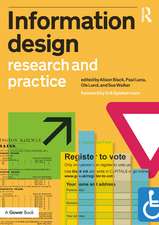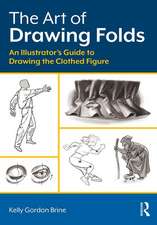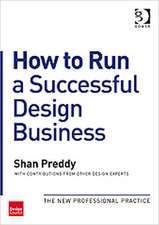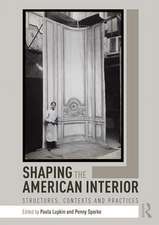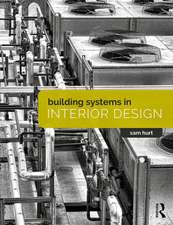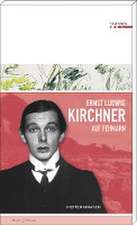Spatial Design Education: New Directions for Pedagogy in Architecture and Beyond
Autor Ashraf M. Salamaen Limba Engleză Hardback – 28 feb 2015
| Toate formatele și edițiile | Preț | Express |
|---|---|---|
| Paperback (1) | 312.43 lei 6-8 săpt. | |
| Taylor & Francis – 12 oct 2017 | 312.43 lei 6-8 săpt. | |
| Hardback (1) | 770.74 lei 6-8 săpt. | |
| Taylor & Francis – 28 feb 2015 | 770.74 lei 6-8 săpt. |
Preț: 770.74 lei
Preț vechi: 1031.25 lei
-25% Nou
Puncte Express: 1156
Preț estimativ în valută:
147.48€ • 153.98$ • 122.06£
147.48€ • 153.98$ • 122.06£
Carte tipărită la comandă
Livrare economică 05-19 aprilie
Preluare comenzi: 021 569.72.76
Specificații
ISBN-13: 9781472422873
ISBN-10: 1472422872
Pagini: 414
Dimensiuni: 174 x 246 x 32 mm
Greutate: 0.82 kg
Ediția:1
Editura: Taylor & Francis
Colecția Routledge
Locul publicării:Oxford, United Kingdom
ISBN-10: 1472422872
Pagini: 414
Dimensiuni: 174 x 246 x 32 mm
Greutate: 0.82 kg
Ediția:1
Editura: Taylor & Francis
Colecția Routledge
Locul publicării:Oxford, United Kingdom
Notă biografică
Ashraf M. Salama is Chair Professor in Architecture and Head of Architecture at the University of Strathclyde, Glasgow, UK.
Recenzii
’This is indeed an inspiring and thought provoking contribution to the field of design pedagogy in its fullest sense. Calling for new forms of pedagogy, the argument for civic engagement, critical inquiry, and reflective design practices is elucidated to reflect emerging understandings of design education. With substantial international experience, the author offers an authoritative account of spatial design pedagogy with a focus on architectural and urban design education, covering a diverse range of topics in a wide variety of contexts. Tracing evolutionary theories and approaches of education from the second half of the 20th century to the present is a commendable aspect of this work. This is a must-have book for both design students and built environment professionals, but most importantly, it is essential reading for every design educator worldwide.’ Halina Dunin-Woyseth, Oslo School of Architecture, Norway ’Spatial Design Education: New Directions for Pedagogy in Architecture and Beyond is a proactive book that transparently presents promising approaches to tap into latent potentials and exciting opportunities in teaching architecture. Salama’s candid review and analysis importantly fills a gap in literature on architecture pedagogy. The book is comprehensive, critical and experimental and very much analogous to the way we all want to teach architecture.’ Tammy Gaber, Laurentian University School of Architecture, Canada 'No other profession has undergone as dramatic a transformation in the past decade as architecture. In this well-researched, intelligent, and provocative examination of the history, current state, and future prospects of architectural pedagogy on a global scale, Ashraf Salama challenges us to both broaden and deepen the debate about how professional education might, indeed must, change.' Michael J. Crosbie, University of Hartford, USA 'With the voice of an experienced educator on the frontline of architectural education, Ashraf Sal
'This is indeed an inspiring and thought provoking contribution to the field of design pedagogy in its fullest sense. Calling for new forms of pedagogy, the argument for civic engagement, critical inquiry, and reflective design practices is elucidated to reflect emerging understandings of design education. With substantial international experience, the author offers an authoritative account of spatial design pedagogy with a focus on architectural and urban design education, covering a diverse range of topics in a wide variety of contexts. Tracing evolutionary theories and approaches of education from the second half of the 20th century to the present is a commendable aspect of this work. This is a must-have book for both design students and built environment professionals, but most importantly, it is essential reading for every design educator worldwide.' Halina Dunin-Woyseth, Oslo School of Architecture, Norway
'Spatial Design Education: New Directions for Pedagogy in Architecture and Beyond is a proactive book that transparently presents promising approaches to tap into latent potentials and exciting opportunities in teaching architecture. Salama's candid review and analysis importantly fills a gap in literature on architecture pedagogy. The book is comprehensive, critical and experimental and very much analogous to the way we all want to teach architecture.' Tammy Gaber, Laurentian University School of Architecture, Canada
'No other profession has undergone as dramatic a transformation in the past decade as architecture. In this well-researched, intelligent, and provocative examination of the history, current state, and future prospects of architectural pedagogy on a global scale, Ashraf Salama challenges us to both broaden and deepen the debate about how professional education might, indeed must, change.' Michael J. Crosbie, University of Hartford, USA
'With the voice of an experienced educator on the frontline of architectural education, Ashraf Salama offers an audacious yet thoroughly researched examination of design pedagogies and ethics in a changing world. More than just a condemnation of outmoded studio culture, this book presents insightful accounts of both historic development as well as past and emerging innovations in design education. An extraordinary sourcebook for design educators and students.' Jeff Hou, University of Washington, USA
'Building on a rigorous and critical examination of a wide spectrum of architectural design pedagogies over time, Ashraf Salama constructs a convincing argument for the need for a design pedagogy that is more responsive to today's social and environmental demands. Salama's well-articulated description of a multi-layered "trans-critical" pedagogy that promotes a democratic and inclusive theory of education couldn't be more timely. This book is ground breaking in its attempt to identify pedagogical approaches to the challenges faced in the profession by the changing role of the architect and is invaluable for researchers, practitioners, graduate students and educators in architecture.' Karen Keddy, Ball State University, USA
'Due to EU directives, UK architectural education is facing imminent change - specifically, to become shorter, more affordable, and more practice integrated - so that it matches the programs offered by its EU university counterparts/competitors. What Professor Salama's book offers is a methods statement - an invaluable resource book for educators needing to rethink their curricula to meet this demand for change. It provides passionate educators, participation-inclined practitioners and engaged students with practical inspiration from a range of excellent case studies that demonstrate experimental, spatially and socially innovative pedagogies.' Harriet Harriss, Oxford Brookes University, UK
'As a professor who constantly looks to unlock the doors of innovative thought and practice in the studio-based classroom, this book, Spatial Design Education by Ashraf Salama, is the master key. Salama creates the convincing argument for pedagogical change and then systematically evaluates examples of current evolving paradigms that are making that change happen. If you want to be part of that change then this book should be your guide.' Jeffrey Haase, The Ohio State University, USA
'This is indeed an inspiring and thought provoking contribution to the field of design pedagogy in its fullest sense. Calling for new forms of pedagogy, the argument for civic engagement, critical inquiry, and reflective design practices is elucidated to reflect emerging understandings of design education. With substantial international experience, the author offers an authoritative account of spatial design pedagogy with a focus on architectural and urban design education, covering a diverse range of topics in a wide variety of contexts. Tracing evolutionary theories and approaches of education from the second half of the 20th century to the present is a commendable aspect of this work. This is a must-have book for both design students and built environment professionals, but most importantly, it is essential reading for every design educator worldwide.' Halina Dunin-Woyseth, Oslo School of Architecture, Norway
'Spatial Design Education: New Directions for Pedagogy in Architecture and Beyond is a proactive book that transparently presents promising approaches to tap into latent potentials and exciting opportunities in teaching architecture. Salama's candid review and analysis importantly fills a gap in literature on architecture pedagogy. The book is comprehensive, critical and experimental and very much analogous to the way we all want to teach architecture.' Tammy Gaber, Laurentian University School of Architecture, Canada
'No other profession has undergone as dramatic a transformation in the past decade as architecture. In this well-researched, intelligent, and provocative examination of the history, current state, and future prospects of architectural pedagogy on a global scale, Ashraf Salama challenges us to both broaden and deepen the debate about how professional education might, indeed must, change.' Michael J. Crosbie, University of Hartford, USA
'With the voice of an experienced educator on the frontline of architectural education, Ashraf Salama offers an audacious yet thoroughly researched examination of design pedagogies and ethics in a changing world. More than just a condemnation of outmoded studio culture, this book presents insightful accounts of both historic development as well as past and emerging innovations in design education. An extraordinary sourcebook for design educators and students.' Jeff Hou, University of Washington, USA
'Building on a rigorous and critical examination of a wide spectrum of architectural design pedagogies over time, Ashraf Salama constructs a convincing argument for the need for a design pedagogy that is more responsive to today's social and environmental demands. Salama's well-articulated description of a multi-layered "trans-critical" pedagogy that promotes a democratic and inclusive theory of education couldn't be more timely. This book is ground breaking in its attempt to identify pedagogical approaches to the challenges faced in the profession by the changing role of the architect and is invaluable for researchers, practitioners, graduate students and educators in architecture.' Karen Keddy, Ball State University, USA
'Due to EU directives, UK architectural education is facing imminent change - specifically, to become shorter, more affordable, and more practice integrated - so that it matches the programs offered by its EU university counterparts/competitors. What Professor Salama's book offers is a methods statement - an invaluable resource book for educators needing to rethink their curricula to meet this demand for change. It provides passionate educators, participation-inclined practitioners and engaged students with practical inspiration from a range of excellent case studies that demonstrate experimental, spatially and socially innovative pedagogies.' Harriet Harriss, Oxford Brookes University, UK
'As a professor who constantly looks to unlock the doors of innovative thought and practice in the studio-based classroom, this book, Spatial Design Education by Ashraf Salama, is the master key. Salama creates the convincing argument for pedagogical change and then systematically evaluates examples of current evolving paradigms that are making that change happen. If you want to be part of that change then this book should be your guide.' Jeffrey Haase, The Ohio State University, USA
Cuprins
1: Introduction; 2: The Evolving Profession and the Actors Involved; 3: The Traditional Approach to Contemporary Design Pedagogy; 4: Pioneering Typologies for a New Design Pedagogy (From the mid 1960s to the late 1990s); 5: Critical Inquiry and Process-Oriented Design Pedagogy (From the late 1990s to the mid 2010s); 6: Interchangeable Design Pedagogies; 7: New Forms of Pedagogy in Lecture-Based Courses in Architecture and Design; 8: Toward a Theory of Transformative and Critical Pedagogies in Architecture and Beyond
Descriere
In this book, design education is dealt with as a paradigm whose evolutionary processes, underpinning theories, contents, methods, tools, are questioned and critically examined.
